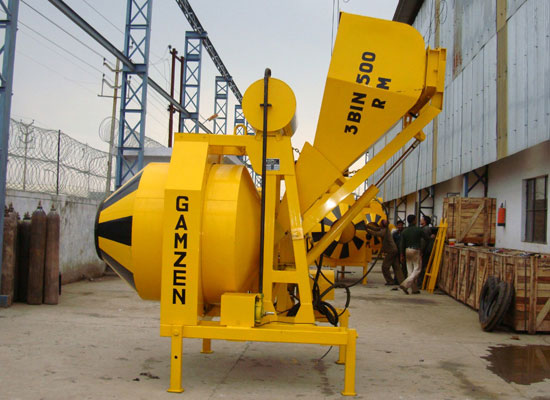When it comes to investing in a concrete batching plant, there are several important factors that need to be carefully considered. In this section, I will discuss three key factors that can help you make an informed purchasing decision.
Construction Environment Evaluation
The construction environment is one of the primary factors that should be taken into account when purchasing a concrete batching plant. Consider the following questions:
What is the size of the construction site? The size of the equipment should be determined based on the available space.
-
How much concrete would be required for the project? The batching plant’s capacity should align with the project’s concrete demand.
-
How busy is the area near the construction site in terms of traffic? This will impact the delivery of materials to and from the site.
-
What is the distance between the construction site and the conveying vehicle? The proximity between the site and the vehicle should be taken into account for efficient transportation of concrete.
Reliability Assessment of Equipment
The reliability of the equipment is crucial to ensure high-quality concrete production. Here are some aspects to consider when evaluating the reliability of a concrete batching plant:
Check the various product features to ensure they meet your specific requirements.
-
Inspect the control system of the equipment for its functionality and user-friendliness.
-
Look for customization options that can be tailored to suit your project needs.
-
Analyze the product parameters to ensure they align with your specifications and requirements.
Cost Analysis and Budgeting
Before making a purchase, it is important to conduct a comprehensive cost analysis of the concrete batching plant. Consider the following cost factors:
Transportation costs: Calculate the expenses involved in transporting the equipment to your site.
-
Installation costs: Determine the costs associated with installing the batching plant.
-
Site preparation costs: Evaluate the expenses related to the preparation of the construction site for the plant.
-
Electrical and plumbing costs: Take into account the electrical and plumbing requirements of the plant.
-
Tax amount, if any: Consider any applicable taxes that may affect the overall cost.
By conducting a thorough cost analysis, you can ensure that your budget aligns with the expenses associated with purchasing and setting up a concrete batching plant.
Critical Aspects to Evaluate in a Concrete Batching Plant
In this section, I will discuss three critical aspects that need to be carefully evaluated when considering a concrete batching plant.
Performance/Cost Ratio Analysis
When assessing the financial aspects of a concrete batching plant, it is important to consider the performance-cost ratio. Simply looking at the price of the plant is not sufficient. Instead, focus on finding equipment that offers more benefits at a reasonable cost. This will help optimize the performance-cost ratio and provide greater value for your investment.
Selection of Main Engine
The main engine of a concrete batching plant plays a vital role in its overall performance. Here are some key attributes to look for when selecting the main engine:
Reliable concrete mixer: Ensure that the concrete mixer is reliable and capable of producing high-quality concrete.
-
Ability to produce good quality concrete: The main engine should be able to consistently produce concrete of the desired quality.
-
Strong overload capacity: Look for an engine that can handle heavy workloads without compromising its performance.
-
High production efficiency: Consider an engine that offers efficient and fast concrete production to meet project timelines.
-
Adaptability to the mixing of various commodities: The main engine should have the capability to mix different types of commodities for versatile concrete production.
Aggregate Options Consideration
The type of cement available in your region is a crucial aspect to consider when purchasing a concrete batching plant. The number of bins required for the plant will depend on the type of aggregate you will be using.
Therefore, understanding the availability of aggregates in your area will help you determine the appropriate configuration for your batching plant.
By carefully evaluating these critical aspects, you can ensure that your chosen concrete batching plant meets your performance requirements and delivers the desired results.
Choosing the Right Concrete Batching Plant for Your Needs
In this section, we will discuss several factors that are crucial for selecting the right concrete batching plant for your specific requirements.
Manufacturer’s Brand Reputation
Opting for a well-known and reliable manufacturer is vital when choosing a concrete batching plant. Consider the following factors regarding the manufacturer:
The technology used in their batching plants.
-
The quality of materials used to assemble the equipment.
-
After-sales services provided by the manufacturer.
-
Whether the manufacturer provides training on the safe and efficient use, as well as regular maintenance and upkeep of the concrete plant.
Choosing a manufacturer with a good brand reputation ensures that you are investing in a high-quality product and have access to reliable support and assistance.
Concrete Plant Customization Options
Every project has unique requirements, and it is important to choose a concrete batching plant that offers customization options. Look for a plant that can be tailored to meet your specific needs, whether it’s modifications in capacity, features, or control systems. Customization ensures that the plant can adapt to the demands of your project and operate efficiently.
Importance of Quality and Price Balance
While cost is an important factor, it should not be the sole determining factor when selecting a concrete batching plant. It is crucial to strike a balance between quality and price. Look for equipment that offers superior quality at an affordable price. A concrete batching plant that provides value for money ensures long-term profitability and efficiency.
By considering these factors, you can make an informed decision and select a concrete batching plant that meets your project requirements.
Understanding Different Types of Concrete Batching Plants
Concrete batching plants come in various types, each designed to suit different construction needs. In this section, we will explore the different types of batching plants and their functionalities.
Stationary, Mobile, and Compact Plant Differences
-
Stationary Concrete Batching Plant: This type of plant remains fixed in one location throughout the project. It is ideal for large-scale projects that require a consistent and high-volume supply of concrete.
-
Mobile Concrete Batching Plant: Designed for easy transportation between job sites, a mobile plant can be quickly set up and disassembled. It is perfect for projects that require concrete at various locations.
-
Compact Concrete Batching Plant: As the name suggests, a compact plant is designed to provide high efficiency and production capacity within a limited space. It is suitable for construction sites with restricted space.
Dry Mix vs. Wet Mix Plant Distinctions
-
Dry Mix Concrete Batching Plant: This type pre-mixes all components except water before loading them into the mixer truck. It offers precise mix proportions and is commonly used for projects with specific concrete requirements.
-
Wet Mix Concrete Batching Plant: A wet mix plant combines all components, including water, within the plant before loading them into the mixer truck. It ensures consistently high-quality concrete mixes and is well-suited for large-scale projects.
Continuous and Batch Type Plant Functions
-
Continuous Concrete Batching Plant: This type operates without interruption, providing a steady and reliable supply of concrete. It is essential for projects with a constant need for concrete and is commonly used in large-scale infrastructure projects.
-
Batch Type Concrete Batching Plant: A batch type plant processes one batch of concrete at a time. It is suitable for projects that require precise control over concrete composition and is commonly used for customized mixes.
Understanding the different types of concrete batching plants helps in selecting the most suitable plant for your specific project requirements.
FAQs
What are the key features to consider in a concrete batching plant?
Some key features to consider in a concrete batching plant include construction environment evaluation, reliability of the equipment, performance-cost ratio analysis, selection of the main engine, aggregate options consideration, and the manufacturer’s brand reputation.
How do the essential features impact the performance of a concrete batching plant?
The essential features mentioned above impact the performance of a concrete batching plant by ensuring that the plant is well-suited to the construction environment, reliable in producing high-quality concrete, cost-effective in terms of performance, and equipped with suitable engines and aggregate options.
Can you explain the importance of each of the 10 essential features in a concrete batching plant?
The 10 essential features, such as evaluating the construction environment, assessing the reliability of the equipment, analyzing the performance-cost ratio, selecting the main engine, considering aggregate options, and evaluating the manufacturer’s brand reputation, help ensure that the chosen concrete batching plant meets the specific requirements of the project.
Are there any specific factors to keep in mind while evaluating a concrete batching plant for these essential features?
While evaluating a concrete batching plant, it is important to consider factors such as the size of the construction site, quantity of concrete required, available aggregate options, customization options, performance-cost ratio, and the reputation of the manufacturer. These factors help in determining the suitability of the plant for the project requirements.

